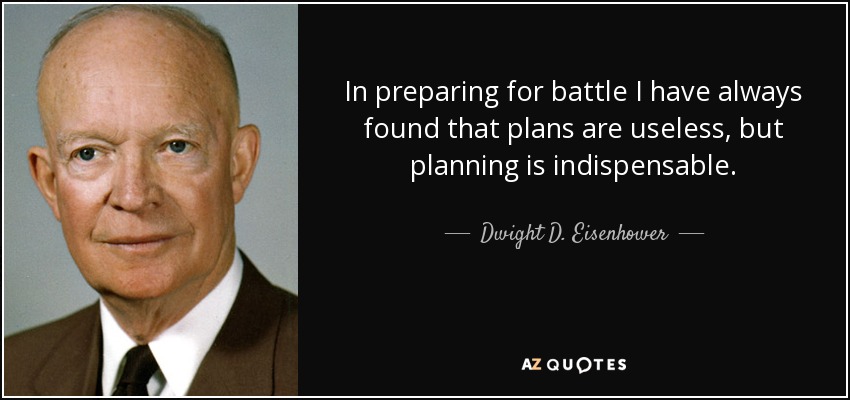Click here to return to Blog Post Intro
A Dozen Ideas for Your Success
At NASA, we reach for new heights and reveal the unknown for the benefit of all humankind.
To accomplish that, it is critical that we constantly push the boundaries of what humans believe is possible. We need to be forward leaning and looking at new technologies and cutting edge solutions. And we need a Strategic Plan.
NASA is on a Journey to Mars, which transcends political boundaries.
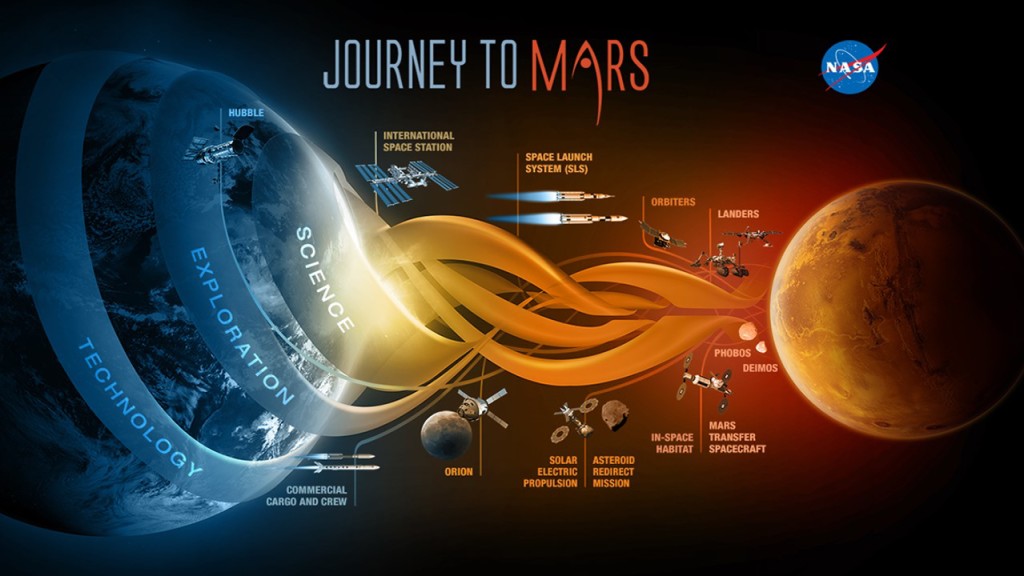
Building on our investments in technology, robotic missions, International Space Station, Commercial Crew & Cargo, Space Launch System, and Orion, America is poised to lead the next wave of partnerships for international science and human space exploration.
You may be saying, “I see NASA’s large plans…but what about me. Where do I start?”
#1: Know Yourself
For an effective self-assessment, you need complete honesty. Be honest with yourself. Ask others to be honest with you. What do you think you do well? What do people around you recognize that you do well? In coaching and counseling people over the years, I’ve found that many people don’t immediately recognize all the strengths that they have…or they may not know how to express those strengths…

What do you think the Lord sees when He looks at your life? He does not need our strengths, our talents, or our plans; He simply wants our willing, obedient hearts. If we make our lives available to Him, He will, in turn, strengthen, empower, and equip us (show Himself strong in us) to accomplish His will so that the watching world will see His love.
#2: Evaluate Your Strengths & Gifts
My “aha” moment came after reading Now, Discover Your Strengths by Marcus Buckingham and Dr. Donald Clifton. Their StrengthsFinder quiz pointed out that my primary strengths are achiever and learner (along with responsibility, analytical, and focus). While I’ve always loved learning—especially about people and leadership—I never fully appreciated it as a “strength”. That revelation helped me move forward to embrace my love of learning and thirst for knowledge. Now, I always capture goals in life for achieving & learning…tied to my primary strengths…
I’ve also used a variety of other assessments, including the Birkman (which revealed that my highest scoring occupation of interest is in the field of Social Service) as well as Uniquely You. On the DISC (Dominance, Influence, Steady, Competent) Personality assessment, I’m a “Steady/Competent” Personality; and my Spiritual Gifts are Leadership & Administration.
#3: Examine Your Values
Identify your core values. That part came easy for me. I reflected on my grandfather (Paw Paw) and my father. Both were public servants with the Corpus Christi Army Depot. From them, I learned the importance of balancing work, family, and church responsibilities. They taught me:
- Integrity: Do what you say
- Excellence: Do your best
- Improvement: Get better over time
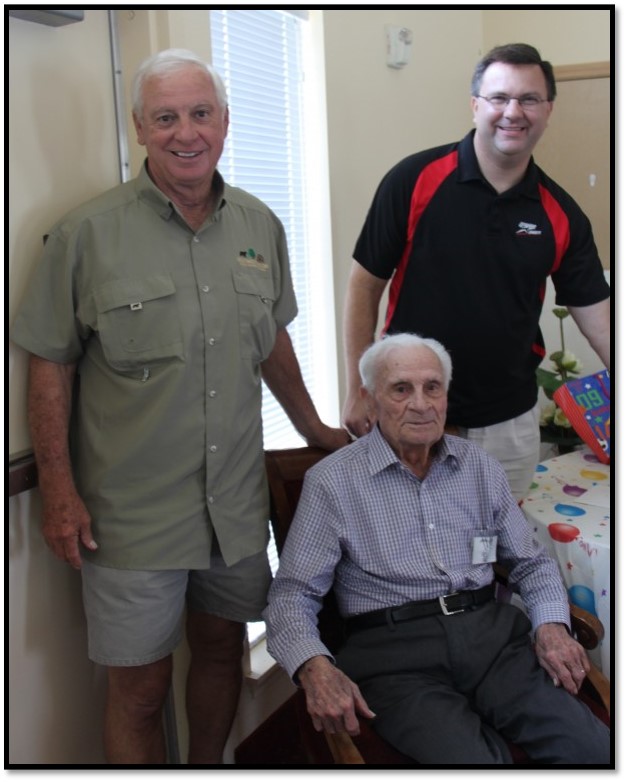
I encourage you to consider:
- Who are your role models?
- What are their values?
- What are your own values?
#4: Prepare a Mission Statement
15 years ago, I used the FranklinCovey Mission Statement Builder (while I used the paper version—they now have an online Mission Statement Builder). I’ve recommended this tool to several people, who have also found it to be a useful tool. Through the process, I came out with my personal mission – “To be a Leader wherever I am and improve Leadership wherever I go”…
Later, I read Laurie Beth Jones’ The Path: Creating Your Mission Statement for Work & Life. She suggests these 3 criteria for a Mission Statement:
- No more than a single sentence long
- Should be easily understood by a 12 year-old
- Should be able to be recited by memory at any time
Based on this advice, I shortened my own mission statement to “Improve Leadership Wherever I Go…”
Like many mission statements, those words may not seem much to you…but for me, they provide clarity about the types of opportunities I should pursue. More importantly, my personal mission gives me a reason not to pursue some opportunities…
Please note that creating a personal mission statement is not something that can be done quickly. My experience suggests that it takes deep thought and reflection, and you may find that it takes several rewrites until you have a mission statement that resonates with you…but keep at. In the end, I can assure you that it’s worth it…
Much like an organization’s mission statement, your personal mission statement should be reviewed regularly—particularly after significant life and work transitions. The bottom line is that you need to create a Personal Mission Statement!
According to the FranklinCovey Web Site, “Your mission statement becomes your constitution, the solid expression of your vision and values. It becomes the criterion by which you measure everything else in your life.”
In order to bring your life vision into clear focus, you need to hear what your heart is telling you to do, not just where your head is telling you to go. What are your passions? Imagine yourself as a ninety year-old gazing back over your life. Which experiences and memories would bring you the most joy and satisfaction?
#5: Think Differently about Your Options
While your job may be part of your mission, a mission is always larger than a job. Jobs can change—and probably will. Statistics say the average person can expect to have 4 different careers in his or her lifetime. While many men tend to define themselves in terms of what they do professionally, many women define themselves by their relationships or roles (like wife or mother). This is a tough spot as our roles change throughout life.
So, I could and think of my ultimate goal to become “HR Director at NASA” even though my coaches encouraged me to think bigger a few years ago… This type of thinking leads me to consider my future possibilities, such as other HR positions at NASA; HR positions in Government; or HR positions outside the Government—in either the non-profit or private sectors. For you, it may be “Project Manager” or “Engineer” in Petrochemical Industry…which may limit your possibilities. At NASA a few years ago, we had to expand thinking for engineers who had 20+ years of experience in Aerospace Industry to translate their skills to oil & gas and other industries at the time.
If I instead focus on mission-based thinking, “Improve Leadership Wherever I Go” opens up a variety of new possibilities. I could pursue things like: designing and developing a Student Leadership Academy at Church or mentoring a Non-Profit Leader. Future job possibilities could include roles like an Executive Director at a Church or Non-Profit or Leadership Speaker & Coach.
#6: How do you define success?
A lot of people measure success by achievement. They are driven to work harder, faster, and smarter; log more hours; and sacrifice other pleasures. Many success-driven people arrive at their destination disillusioned and unfulfilled. Take money and material possessions, for example. Whatever our income level, it’s never enough. At the root of the world’s view of success is the insatiable quest for more. Affluence is defined as “an abundant flow or supply”.
In America, many are infected with affluenza, which can best be described as a painful, contagious, socially transmitted condition of overload, debt, anxiety, and waste resulting from the dogged pursuit of more. We now work more hours each year than do the citizens of any other industrial country, including Japan. In Japan, they have a term for “death by overwork” – Karoshi. 95% of American workers say they wish they could spend more time with their families. If you have a family, like me, you know how fast they grow up. Here are pictures of my kids from Summer 2011 and Summer 2016. You can see how quickly they’ve grown up over the last five years!
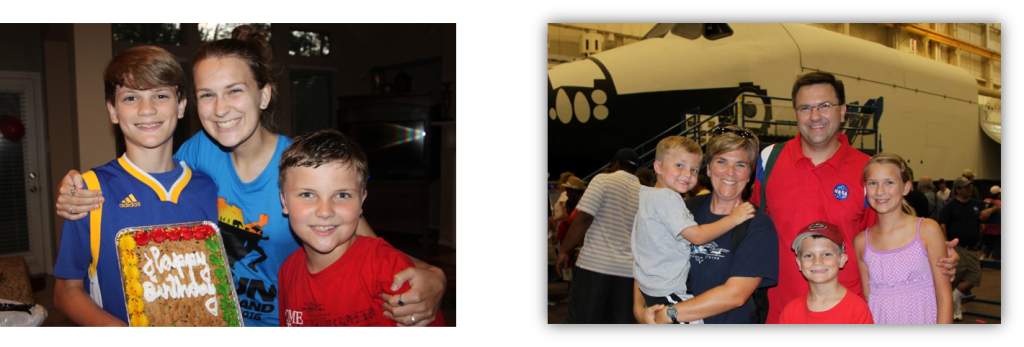
According to The New York Times on the Web, scientific research says, “Not only does having more things prove to be unfulfilling, but people for whom affluence is a priority in life tend to experience an unusual degree of anxiety and depression as well as lower overall level of well-being… Affluence, per se, does not necessarily result in an unsatisfying life. Problems are primarily associated with ‘living a life where that’s your focus.’ ”
#7: Expect the Best…and Measure Progress
Any good plan includes a component of assessment. Periodically, you need to look at where you are in light of where you want to be. Edwards Deming, father of Total Quality Management, used to say, “You can expect what you inspect.”
Sometimes we can get so focused on a particular destination that we lose sight of our day-to-day learning and growth. You need to enjoy the journey…
Several years ago, I attended a leadership class where a leader suggested that we record our leadership learning. Over the next 10 years, I took notes from every leadership book I read, and I periodically review these notes and reflect on improvements I can make.
As a HR professional, I’ve helped organizations over the years plan and conduct organization retreats, where they celebrate their successes of the past year and review their mission and goals for the upcoming year. Recently, I recognized the need to apply this approach to my personal leadership growth and development. I took a day off work for a personal retreat. I took with me my Personal Mission Statement, my Individual Development Plan, Upward Feedback from my team members, and my leadership learning notes.
During the retreat, I developed a “Balanced Scorecard” for myself, which included annual goals for my role as a Husband, Father, Employee, and Church Member.
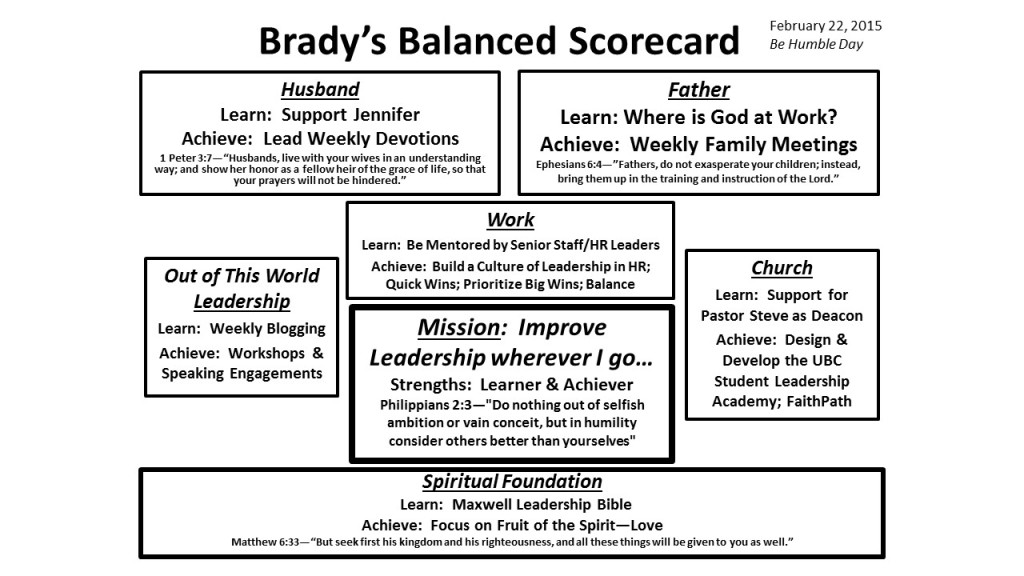
All of those roles are critical to my work-life fit. You’ll need to determine what roles are important for your work-life fit.
In our organization, I often tell employees, “This place will take as much as you give it.” So, you have to determine the boundaries that provide the right balance between your professional goals and your work-life fit. If you’re not intentional about setting those boundaries, I can assure you that you’ll be disappointed in life’s consequences. Unfortunately, I’ve seen too many people climb the professional ladder at the expense of their marriages and families. Again, be sure that you’re making the choices that fit with your personal mission, values, and aspirations both at work and at home.
I’ve found that having a plan and reviewing it periodically is both helpful & important. I would strongly encourage you to take the time you need to make your plan, set goals, and periodically review your plan.
#8: Faithfully Persevere
Faithfulness as a Fruit of the Spirit comes from the Greek word pistis (PEES-tees), meaning one who considers something to be true and worthy of trust. It’s acting based on what you know to be true—even when your emotions or fears make you doubt it. It’s perseverance (“steady hand”) in the face of peer pressure, disrespect or contempt, temptation to cut corners, distractions, busy-ness, or weariness.
We know that God allows adversity and can use it in our lives. It often leads to our deepest learning, the molding of our character, the place where we learn best to trust the good God.
Prayer and faith are intertwined. Prayer expresses our trust that God hears, indeed wants to hear from us. Are you trusting him with your deepest desires and your cries of pain?
#9: Adjust Your Plans
What do you do if your plan isn’t working? Adjust it and continue to move forward…
Keep trying new things, updating and improving your plan as you fail, win and learn.
#10: Involve Others…
Equip yourself continually for success by enlisting and relying upon a team of helpful and supportive individuals.
You can do one thing in life to virtually guarantee your failure: try to make it on your own. If you are not continually sharpened by people who care for you and are committed to your success, you will become a useless and dull knife. Each of us needs a team of people to help us stay on track and encouraged as we live out our vision. The more people you have around you to sharpen you, the more effective you will be. If you are married, the first person on your support team should be your spouse.
No matter how clear your vision may be to you, your family should be on board and supportive of your direction. If they are not up to your speed, slow down and wait for them. It is better to move toward your vision at a slower speed than to leave those dearest to you in your wake.
Accountability partners care enough about each other to ask the tough questions. Meet with this core group regularly, at least a couple of times a month. Share your ongoing vision with one another, both the successes and failures. Affirm each other, encourage each other, and challenge each other to hang in there.
And you need to a mentor. I like to ask, “Who is on your Mount Rushmore of Mentors?” You should be able to quickly identify four people who have helped shape your success. If you don’t have a mentor, get one!
#11: The End…Keep It In Mind
Be clear about where you want to go. As best-selling author Stephen Covey says, you must “begin with the end in mind.” In the words of wise King Solomon, “Lazy hands make a man poor, but diligent hands bring wealth.” If you don’t get on the road and busy yourself with the task of living out your vision, you will never enjoy the rewards of true personal wealth.
I’m a big fan of Phillips, Craig, and Dean. Their song “Nothing to Prove” reveals my heartbeat:
“Live with no excuses, Love with no regrets;
Laugh a lot and leave this life with nothing left unsaid;
Make this world a better place;
Don’t be afraid to cry;
When it’s finally time to say goodbye,
There’s nothin’ to prove…
…nothin’ to lose…
…nothin’ to hide…”
I believe both my Grandfather (who passed away last year on his 95th birthday) and my Father (who celebrates his 68th birthday on Sunday!) can both say that, and I aim too as well!
#12: Have a Plan…But Stay Open to the Possibilities
Whitney T. Kuniholm, president of Scripture Union/USA, takes a fast-paced journey through the book of Acts in his book, The Essential Question, focusing on the question Paul asked Jesus: “What shall I do, Lord?” (Acts 22:10).
The experiences of the first Christians show us that God has a mission, an essential mission, for all of his people―whether it is to serve him faithfully in the marketplace, in the home, in school, in the military or someplace else.
Ultimately, deciding who to be is more important than deciding what to do. Your character—the kind of person you are—will determine what kind of influence you have in whatever career you choose.
Summary
Know Yourself
Evaluate Your Strengths & Gifts
Examine Your Values
Prepare a Mission Statement
Think Differently about Your Options
How do you define success?
Expect the Best…and Measure Progress
Faithfully Persevere
Adjust Your Plans
Involve Others…
The End…Keep It In Mind
Have a Plan…But Stay Open to the Possibilities
For the folks at Between Jobs Ministries, I encouraged them to “Keep the Faith.” That’s essential to all of us, as we shoot for the stars!

